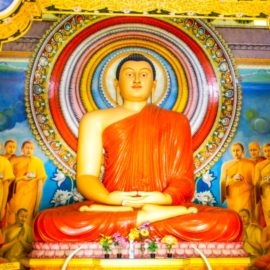

This article is an excerpt from the Shortform book guide to "Orientalism" by Edward Said. Shortform has the world's best summaries and analyses of books you should be reading.
Like this article? Sign up for a free trial here .
Who is Antoine Isaac Silvestre de Sacy? What role did he play in the Oriental Studies of the nineteenth century?
Antoine Isaac Silvestre de Sacy (1758-1838) was a French nobleman, linguist, and Orientalist scholar. He is widely regarded within European academic circles for his work in translating Arabic as well as his success as a leading Orientalist.
Read about Antoine Isaac Silvestre de Sacy’s career and contributions.
Who Was Antoine Isaac Silvestre de Sacy?
Antoine Isaac Silvestre de Sacy was one of the intellectual patriarchs of Orientalism. His expertise as an Orientalist made him an important figure within the French imperial state. He served in key posts for the French Empire, advising on France’s interests in the Middle East. De Sacy was an important figure in straddling the gap between academia and public policy—a symbiotic relationship that would become a hallmark of Orientalism as the 19th century wore on.
De Sacy’s students went on to become some of Europe’s leading Orientalist scholars, including figures like Jean-François Champollion (1790-1832), discoverer of Egypt’s famous Rosetta Stone. Through them, de Sacy’s approach to scholarship influenced the study of the Orient across Europe for the next generation and well into the 20th century.
A figure fully within the Orientalist tradition, de Sacy saw his role as an interpreter, compiler, editor, and commentator on the Orient. He, like most Orientalist scholars, saw himself bringing to light and unearthing lost knowledge. He believed that experts like himself existed to transmit knowledge of the Orient to Europeans. This knowledge was a symbol and instrument of power. Knowledge gave European Orientalists the ability to define and proscribe the Orient in the collective mind of the West, and justify imperial incursions on the grounds that well-educated, enlightened Europeans were best positioned to save the culture and legacy of the Orient from the barbarism of the modern “Orientals.”
This was why his work focused on compiling vast stores of knowledge into multi-volume compendia for European consumption. Inherent to this compilation process was the scholar’s subjective judgments about which parts of the Orient were important and which weren’t, and what was and wasn’t worthy of inclusion. This Eurocentric approach to scholarship resulted in the erasure of those elements of Eastern culture and religion that the Orientalists deemed unworthy or unimportant.

———End of Preview———
Like what you just read? Read the rest of the world's best book summary and analysis of Edward Said's "Orientalism" at Shortform .
Here's what you'll find in our full Orientalism summary :
- How Western society invented the concept of Orientalism
- Why "the Orient" was thought of as a different, exotic, and dangerous place
- How Orientalism was central to European colonialism






